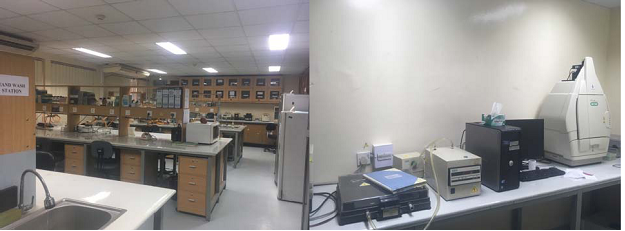Laboratory of Gut-Brain Signaling
 Facility Head: Dr. Zhahirul Islam, MSc, PhD
Facility Head: Dr. Zhahirul Islam, MSc, PhD
Dr Zhahirul Islam is working as Scientist and Head of the Laboratory of Gut-Brain Signaling (GBS) under Laboratory Sciences and Services Division of icddr,b. Dr Islam obtained his PhD from Erasmus University Medical Centre, Rotterdam, The Netherlands. He has received the Emerging Global Leader Award by National Institute of Health (2019-2024) and the Global Health Equity Scholars award (2015-2016) by the Fogarty International Center/NIH and the Center for Innovation in Global Health at Stanford, USA.
Dr Islam’s research focuses on infectious diseases and peripheral neuropathy. He has a broad background in the field Campylobacter infection and Guillain-Barré syndrome in Bangladesh, with specific training and expertise including clinical epidemiology, host-pathogen interaction, comparative microbial genomics and genetic epidemiology. Besides basic and applied immunology of infectious diseases, his work also encompasses clinical and large field based studies including Phase 1/ Phase 2 clinical trials. He is successfully coordinating a “phase 1/ phase 2 study to evaluate the safety, tolerability, efficacy, pharmacokinetics and pharmacodynamics of ANX005 in participants with GBS” in Bangladesh. He has been successfully leading International GBS Outcome Study (IGOS), a multi-country study as country coordinator, collaborated with Erasmus University. Dr Islam and his team have developed low-cost therapy (i.e. Small Volume Plasma Exchange) for the treatment of GBS patients in low-income countries. Dr Islam’s lab also focuses on the mechanism of development of antimicrobial resistance in Salmonella, Shigella and related organisms.
The Laboratory of Gut-Brain Signaling focuses on microbial phenotyping and molecular epidemiology of Campylobacter, Shigella, Salmonella, Vibrio cholerae, enterotoxigenic E. coli (ETEC), enteropathogenic E. coli (EPEC), and Shiga-toxin-producing E. coli. Besides these, mechanisms of antibiotic resistance of Shigella and Salmonella typhi also hold a major research interest of this laboratory. A wide range of techniques have been practiced in this laboratory to monitor the host-pathogen interaction that include different types of polymerase chain reaction (RT-PCR, qPCR, Allele specific PCR, etc.), gel electrophoresis, pulse field gel electrophoresis, restriction fragment length polymorphism, enzyme linked immunosorbent assay etc.
Since the eradication of polio in Bangladesh, Guillain-Barré syndrome (GBS) is the most common cause of acute flaccid paralysis with high incidence and mortality rate in Bangladesh. The laboratory has been significantly contributing to understand the epidemiology and pathogenesis of GBS and has taken the lead of GBS research in Bangladesh. Till date, the laboratory enrolled one of the largest GBS cohorts in the world.

GBS is a life threatening post infectious autoimmune disease triggered by molecular mimicry between microorganism and host nerve cells. However, the actual pathogenesis of the disease has still remained unclear. Dr Islam and his team have gone a long way to identify the mystery behind this mechanism by understanding the host-pathogen interaction of GBS. Moreover, researchers of this lab have started exploring the relationship between gut microbiome and cellular immune response of GBS patients. Widely used techniques like 16S rRNA sequencing and flow cytometric assay (FACs) have also been adopted in this lab recently. Since 2010, the team has been actively working on the development and improvement of capacity for Nerve Conduction Study (NCS) and Electromyography (EMG). It started this service for all patients as part of the income generating initiative of the centre.
To build capacity, national and international fellows are frequently provided with training on clinical epidemiology and various molecular aspects. M.S., M.Phil, and Ph.D. students conduct their theses routinely under the supervision of scientists in collaboration with various universities of Bangladesh and other parts of the world. Currently three doctoral students are doing their PhD in this laboratory under Dr Islam’s supervision.
The laboratory of GBS has international collaboration with Erasmus University Medical Center, Rotterdam, the Netherlands; University of Glasgow, UK; Washington State University, USA and University of Texas, Houston, USA. It has also strong collaboration with National Institute of Neurosciences and Hospital (NINS) and Dhaka Medical College Hospital (DMCH).